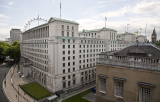UK News
-
 UK unveils £20m innovation fund to tackle drug and alcohol addiction with AI, wearables and new medicines
The UK government has announced a £20 million funding boost for innovators developing new medicines, medical technologies and digital tools aimed at reducingRead More...
UK unveils £20m innovation fund to tackle drug and alcohol addiction with AI, wearables and new medicines
The UK government has announced a £20 million funding boost for innovators developing new medicines, medical technologies and digital tools aimed at reducingRead More... -
 UK government commits £73.4m record funding to protect synagogues, mosques and faith sites
Faith communities across the UK are set to benefit from a record £73.4 million investment in protective security, as the government confirms funding levels forRead More...
UK government commits £73.4m record funding to protect synagogues, mosques and faith sites
Faith communities across the UK are set to benefit from a record £73.4 million investment in protective security, as the government confirms funding levels forRead More... -
 Wales to lead UK’s autonomous defence revolution under £50m growth deal
Wales is set to become the UK’s frontline testing ground for the next generation of autonomous and uncrewed defence technology, following the signing of a landmark £50 million WalesRead More...
Wales to lead UK’s autonomous defence revolution under £50m growth deal
Wales is set to become the UK’s frontline testing ground for the next generation of autonomous and uncrewed defence technology, following the signing of a landmark £50 million WalesRead More... -
 UK names Antonia Romeo as first female head of civil service under Starmer reforms
The United Kingdom has appointed Antonia Romeo as Cabinet Secretary, marking the first time a woman has taken on the most senior role in the civil service.Read More...
UK names Antonia Romeo as first female head of civil service under Starmer reforms
The United Kingdom has appointed Antonia Romeo as Cabinet Secretary, marking the first time a woman has taken on the most senior role in the civil service.Read More... -
 Britain’s Prince Andrew arrested over alleged ties to Jeffrey Epstein
Britain’s former Prince Andrew, the younger brother of King Charles III, has been arrested on suspicion of misconduct in public office, amid allegations that he shared confidential governmentRead More...
Britain’s Prince Andrew arrested over alleged ties to Jeffrey Epstein
Britain’s former Prince Andrew, the younger brother of King Charles III, has been arrested on suspicion of misconduct in public office, amid allegations that he shared confidential governmentRead More...

Culture
-
 Professor Dame Carol Black GBE reappointed as Chair of the British Library for 2026–2027
The UK Secretary of State has confirmed the extension of Professor Dame Carol Black GBE as Chair of the British Library, continuing her leadership from 1 September 2026 to 31 August 2027.Read More...
Professor Dame Carol Black GBE reappointed as Chair of the British Library for 2026–2027
The UK Secretary of State has confirmed the extension of Professor Dame Carol Black GBE as Chair of the British Library, continuing her leadership from 1 September 2026 to 31 August 2027.Read More... -
 Climate, community and care: Soma Surovi Jannat’s landmark exhibition at the Ashmolean Museum
From spring through autumn 2026, the Ashmolean Museum presents 'Soma Surovi Jannat: Climate Culture Care', a powerful new exhibition that places climateRead More...
Climate, community and care: Soma Surovi Jannat’s landmark exhibition at the Ashmolean Museum
From spring through autumn 2026, the Ashmolean Museum presents 'Soma Surovi Jannat: Climate Culture Care', a powerful new exhibition that places climateRead More... -
 Londoners on trial: 700 years of crime revealed in a free City archives exhibition
From medieval pickpockets to notorious Victorian figures, seven centuries of crime, punishment and public fascination are laid bare in a new exhibition atRead More...
Londoners on trial: 700 years of crime revealed in a free City archives exhibition
From medieval pickpockets to notorious Victorian figures, seven centuries of crime, punishment and public fascination are laid bare in a new exhibition atRead More... -
 Lost for centuries, Henry VIII’s golden love pendant finds a home at the British Museum
A golden heart pendant once symbolizing the doomed marriage of Henry VIII and Katherine of Aragon has finally been secured for permanent display at the BritishRead More...
Lost for centuries, Henry VIII’s golden love pendant finds a home at the British Museum
A golden heart pendant once symbolizing the doomed marriage of Henry VIII and Katherine of Aragon has finally been secured for permanent display at the BritishRead More... -
 British High Commission hosts Caledonian Ball in Lahore to celebrate growing Scotland–Pakistan partnership
The British High Commission brought a touch of Scotland to Lahore this week as it hosted the Caledonian Ball at the historic Sir Ganga Ram Residence, celebratingRead More...
British High Commission hosts Caledonian Ball in Lahore to celebrate growing Scotland–Pakistan partnership
The British High Commission brought a touch of Scotland to Lahore this week as it hosted the Caledonian Ball at the historic Sir Ganga Ram Residence, celebratingRead More... -
 300-year-old Rysbrack Marble putti blocked from export as UK scrambles to save national treasure
A three-century-old marble sculpture by renowned eighteenth-century sculptor Michael Rysbrack has been placed under a temporary UK export ban, giving BritishRead More...
300-year-old Rysbrack Marble putti blocked from export as UK scrambles to save national treasure
A three-century-old marble sculpture by renowned eighteenth-century sculptor Michael Rysbrack has been placed under a temporary UK export ban, giving BritishRead More... -
 Inside ICG PR: how an international PR agency shapes reputation for luxury, fashion, and cultural brands
Interview: the co-founder of Iris Consulting Group Iryna Kotlyarevska on building global visibility with cultural intelligenceRead More...
Inside ICG PR: how an international PR agency shapes reputation for luxury, fashion, and cultural brands
Interview: the co-founder of Iris Consulting Group Iryna Kotlyarevska on building global visibility with cultural intelligenceRead More... -
 London Zoo’s giraffes take centre stage in New London Underground poster celebrating 200 years of ZSL
London Zoo’s iconic giraffes have stepped into the spotlight with the launch of a striking new London Underground poster, marking the start of ZSL’s 200th anniversaryRead More...
London Zoo’s giraffes take centre stage in New London Underground poster celebrating 200 years of ZSL
London Zoo’s iconic giraffes have stepped into the spotlight with the launch of a striking new London Underground poster, marking the start of ZSL’s 200th anniversaryRead More... -
 Rare 18th-century ‘Shock Dog’ sculpture by Anne Damer faces possible export from the UK
A rare 18th-century terracotta sculpture of a dog by pioneering British artist Anne Seymour Damer has been placed under a temporary export bar, amid concerns it could leave the UK unless aRead More...
Rare 18th-century ‘Shock Dog’ sculpture by Anne Damer faces possible export from the UK
A rare 18th-century terracotta sculpture of a dog by pioneering British artist Anne Seymour Damer has been placed under a temporary export bar, amid concerns it could leave the UK unless aRead More... -
 Astronomers Take Over: hands-on space gallery and live Planetarium shows launch at the National Maritime Museum
A new space adventure is landing in Greenwich. ‘Astronomers Take Over’, a playful, hands-on gallery led by real astronomers, opens at the National Maritime MuseumRead More...
Astronomers Take Over: hands-on space gallery and live Planetarium shows launch at the National Maritime Museum
A new space adventure is landing in Greenwich. ‘Astronomers Take Over’, a playful, hands-on gallery led by real astronomers, opens at the National Maritime MuseumRead More... -
 UK Prime Minister champions British theatre’s growing success in China during Shanghai visit
The Prime Minister has highlighted the growing global influence of British theatre during a visit to Shanghai, underlining how the UK’s creative industries are driving economic growth andRead More...
UK Prime Minister champions British theatre’s growing success in China during Shanghai visit
The Prime Minister has highlighted the growing global influence of British theatre during a visit to Shanghai, underlining how the UK’s creative industries are driving economic growth andRead More... -
 King Charles and Queen Camilla host green carpet premiere at Windsor Castle for new Amazon prime film
King Charles, with Queen Camilla by his side, opened the doors of the longest-occupied castle in Europe for a sparkling evening at Windsor Castle, marking the premiere of ‘Finding Harmony –Read More...
King Charles and Queen Camilla host green carpet premiere at Windsor Castle for new Amazon prime film
King Charles, with Queen Camilla by his side, opened the doors of the longest-occupied castle in Europe for a sparkling evening at Windsor Castle, marking the premiere of ‘Finding Harmony –Read More...

British Queen celebrates
Most Read
- Teen held after US woman killed in London stabbings
- Heave-ho Harry! Prince prepares to join the walking wounded in ice trek to North Pole
- Football: Farhad Moshiri adamant Everton deal above board
- "Master of English Style". Interview with Designer Lydia Dart
- Letter to the Financial Times from Lord Mayor Alderman Michael Bear
World News

The Soviet-designednerve agent Novichok that Germany says poisoned Russian opposition figure Alexei Navalny is a military-grade toxin banned as a chemical weapon after it was

After Britain ordered the phased removal of Huawei from its 5G network, attention has now switched to China's role in other areas of the UK, particularly its involvement in key nuclear power

A bug involving US-based telecoms giant CenturyLink briefly interrupted internet service in several global markets Sunday, affecting popular streaming services, gaming platforms and webcasts

Pro-democracy activist Joshua Wong told on Sunday (Aug 23) how he constantly feared arrest following the imposition of a new security law in Hong Kong, in a virtual appearance at British

President Donald Trump announced Wednesday that Secretary of State Mike Pompeo will activate a controversial mechanism aimed at reimposing UN sanctions on Iran, escalating a row with

A trio of paintings by British street artist Banksy will be auctioned in London on Tuesday, with the expected proceeds of more than $1 million to be donated to a Palestinian hospital.

Irish no-frills airline Ryanair nosedived into the red in the first quarter, as the coronavirus pandemic decimated air travel demand and grounded fleets worldwide, the group said Monday.

Britain and the European Union on Thursday broke up their latest round of post-Brexit trade negotiations by ruling out a quick deal but voicing hope for agreement in the coming months.

Former British intelligence officer Christopher Steele testified Wednesday that he never intended for his 2016 compilation of unverified reports about Russia's links to Donald Trump to go public.

Hong Kong expatriates living in Britain have welcomed London's pledge of "a pathway to future citizenship" for millions of the territory's residents after China imposed a controversial security






















